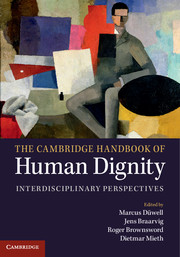Book contents
- Frontmatter
- Contents
- List of contributors
- Foreword
- Why a handbook on human dignity?
- Acknowledgments
- 1 Human dignity from a legal perspective
- 2 Human dignity: concepts, discussions, philosophical perspectives
- Part I Origins of the concept in European history
- Part II Beyond the scope of the European tradition
- Part III Systematic conceptualization
- Part IV Legal implementation
- Part V Conflicts and violence
- 47 Human dignity and war
- 48 Treatment of prisoners and torture
- 49 Human dignity and prostitution
- 50 Human dignity, immigration and refugees
- Part VI Contexts of justice
- Part VII Biology and bioethics
- Appendix 1 Further reading
- Appendix 2 Universal Declaration of Human Rights
- Index
- References
50 - Human dignity, immigration and refugees
from Part V - Conflicts and violence
Published online by Cambridge University Press: 05 March 2015
- Frontmatter
- Contents
- List of contributors
- Foreword
- Why a handbook on human dignity?
- Acknowledgments
- 1 Human dignity from a legal perspective
- 2 Human dignity: concepts, discussions, philosophical perspectives
- Part I Origins of the concept in European history
- Part II Beyond the scope of the European tradition
- Part III Systematic conceptualization
- Part IV Legal implementation
- Part V Conflicts and violence
- 47 Human dignity and war
- 48 Treatment of prisoners and torture
- 49 Human dignity and prostitution
- 50 Human dignity, immigration and refugees
- Part VI Contexts of justice
- Part VII Biology and bioethics
- Appendix 1 Further reading
- Appendix 2 Universal Declaration of Human Rights
- Index
- References
Summary
The aim of this chapter is to inquire how the principle of human dignity applies to the political question of the treatment of immigrants and refugees. Human dignity is often given two related meanings: first, the intrinsic and equal value of each human being; and, second, a dignified human life, i.e. a life lived under decent conditions. Decent conditions imply for example freedom and education, as well as the absence of repression, torture and starvation. Both meanings are related to human rights; owing to her intrinsic value each human being has rights to freedom, health etc. Human dignity in the second sense informs us about the requirements for a decent human life, i.e. the content of human rights (Collste 2002).
Refugees and immigrants are in a vulnerable position. They are forced to leave their homes and are potential victims of exploitation and extortion. This chapter deals primarily with the political and ethical conditions for respecting the human dignity of immigrants and refugees. How can a ‘global political practice’ (Heuser 2008: 71) of respecting their dignity be justified from a moral point of view? There is a link between arguments for human dignity, human rights and moral cosmopolitanism. According to moral cosmopolitanism, the individual human being is the ultimate unit of worth and entitled to equal consideration regardless of such contingencies as nationality and citizenship (Beitz 1999; Tan 2004).
- Type
- Chapter
- Information
- The Cambridge Handbook of Human DignityInterdisciplinary Perspectives, pp. 461 - 468Publisher: Cambridge University PressPrint publication year: 2014
References
- 3
- Cited by

